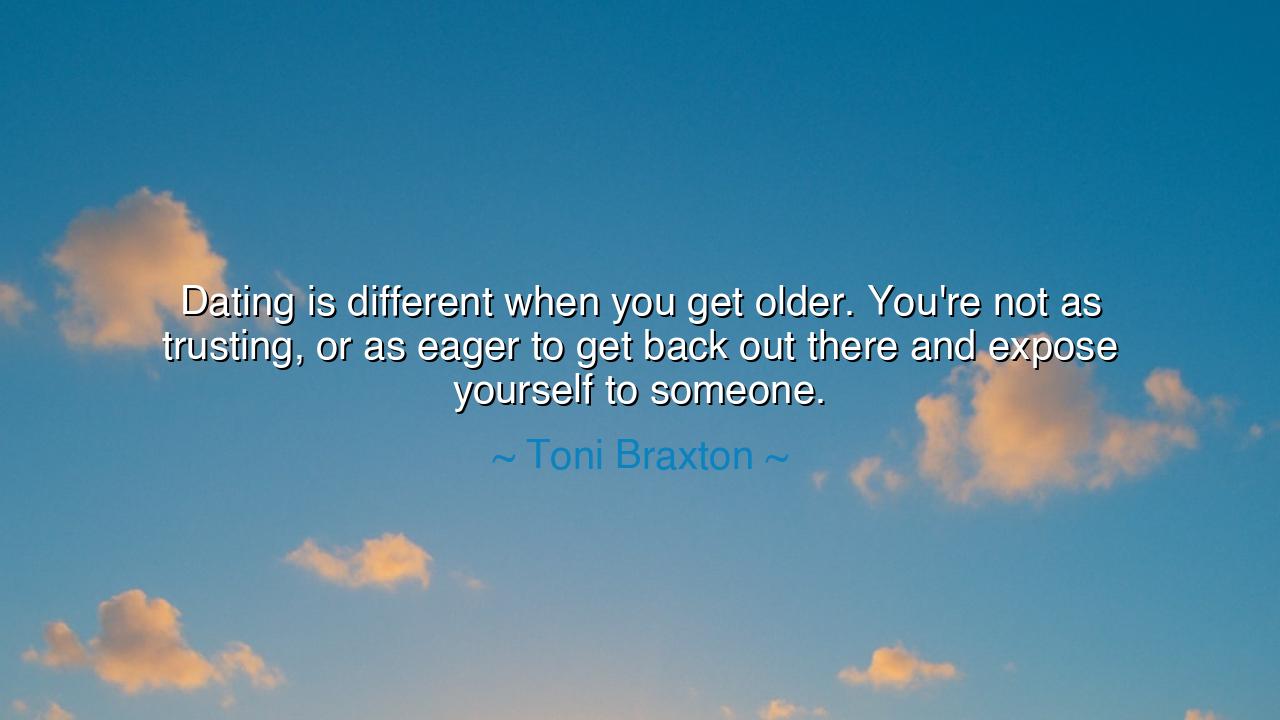
Dating is different when you get older. You're not as trusting
Dating is different when you get older. You're not as trusting, or as eager to get back out there and expose yourself to someone.






There are words that do not merely describe the passage of time, but the deep changes that time brings upon the human heart. Such are the words of Toni Braxton, who once reflected with quiet honesty: “Dating is different when you get older. You’re not as trusting, or as eager to get back out there and expose yourself to someone.” In this simple confession lies a profound truth — the truth that love, like life itself, evolves with experience. It is not that the heart grows weaker with age; rather, it grows wiser, more cautious, more aware of its own fragility and the cost of opening itself once again.
In youth, love rushes like spring rain — sudden, fierce, and unrestrained. The young heart, untouched by deep betrayal, trusts easily, believing that affection alone can overcome the storms of misunderstanding and time. But with the passing of years, as love is lost, promises are broken, and hearts are tested, that innocence transforms into guardedness. This is what Braxton means when she says, “you’re not as trusting.” It is not distrust born of cynicism, but of understanding. The older heart knows that to love is to risk, and that every act of vulnerability is a gamble of the soul.
Yet, in her words there is no bitterness — only wisdom. To be “not as eager to get back out there” is not to have given up on love, but to have learned that connection cannot be rushed. The ancients often spoke of the seasons of the heart: youth as the season of passion, maturity as the season of discernment. A young person leaps into love as one dives into a river, headlong and breathless. But one who has lived, who has been hurt and healed, steps carefully, testing the current, not out of fear, but from respect for its depth. Braxton’s reflection reminds us that love in maturity is not less powerful — it is more deliberate, more sacred, because it is chosen with eyes wide open.
Consider the story of Queen Cleopatra, who loved and lost in the theater of empire. Her first loves, with Caesar and then Antony, were grand and reckless, consuming her as fire consumes dry leaves. But when the tides of war turned against her, she learned what many do — that love and vulnerability are intertwined, and that to love greatly is also to stand exposed to pain. By the time she met her final fate, Cleopatra had become not loveless, but guarded, aware that love, though divine, is no shield against the world’s cruelty. Like Braxton, she too had learned that the older one grows, the more one seeks not the thrill of passion, but the peace of understanding.
There is something noble in this guardedness — it is not the wall of the coward, but the armor of the experienced. For to “expose yourself to someone,” as Braxton says, is no light act. It is to reveal one’s flaws, one’s history, one’s scars. In youth, one shows only the bright surface of the self; but as the years pass, the soul carries its wounds like sacred inscriptions. To share them requires trust not only in the other, but in one’s own resilience — the belief that even if love fails again, one will endure. That is the true courage of mature love: not the innocence of the untested, but the strength of the forgiven and forgiving.
The ancients often compared love to the art of battle. A young warrior charges without fear, confident in his unscarred body. An older one fights with care, knowing the price of every wound. So too in love: age teaches the strategy of the heart. The eagerness of youth is replaced by patience, and from that patience comes a deeper connection — one built not on fantasy, but on truth. It is the difference between fire and embers: the first burns hot and fast, the second glows long and steady, giving warmth through the coldest night.
Thus, the lesson in Toni Braxton’s words is not one of sorrow, but of awakening. She teaches that to love wisely is to love bravely — to accept that trust may come slowly, but to allow it nonetheless. The heart must not close itself entirely, even after disappointment, for the cost of complete safety is isolation. Instead, we must learn to open gently, to choose carefully, and to love again, not as we did before, but as we are now — wiser, steadier, and more real.
So let these words be a guide to all who have loved and lost, and yet still long to love again: Do not rush your heart, but do not silence it. Trust cautiously, but do not cease to trust. Remember that every scar is proof not of weakness, but of survival. The older heart may not love as freely as the young one, but it loves more truly — for it knows the value of what it offers, and the courage it takes to offer it again.






AAdministratorAdministrator
Welcome, honored guests. Please leave a comment, we will respond soon